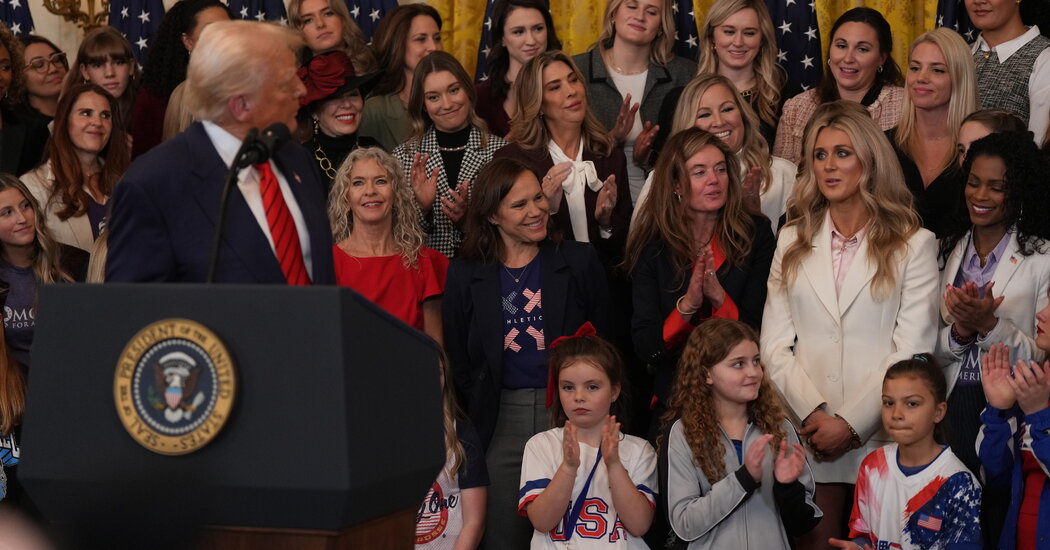
President Trump’s executive order effectively barring transgender athletes from competing in girls’ and women’s sports relies heavily on a new interpretation of Title IX, the 1972 civil rights law prohibiting sex discrimination in educational programs that receive federal funding.
The order directs the Department of Education to investigate schools that do not comply and withdraw federal funding. It also directs the State Department to demand changes within the International Olympic Committee, which has left eligibility rules up to the global federations that govern different sports.
Here is what we know about the order, called “Keeping Men Out of Women’s Sports.”
How does Title IX fit into these arguments?
Title IX prohibits sex discrimination at youth and college-level educational programs that receive federal funding. Because it falls under the executive branch, it is subject to varying interpretations by different administrations that have used it to argue both for and against the inclusion of transgender students.
In 2023, the Biden administration proposed a rule change that would prevent schools from “categorically” barring transgender athletes from teams that match their gender identities, calling such rules a violation of Title IX. The proposal would give universities and K-12 schools the discretion to limit the participation of transgender students when there were questions around competitive fairness.
“To take care of trans women and girls, the Biden administration sought to interpret the sports exception in a sex-blind way — we won’t look at your sex, just your gender identity,” said Doriane Coleman, a Duke University law professor and an expert in gender and sports.
But the proposal, bogged down by lawsuits, was only briefly implemented in some states, and the Biden administration withdrew the regulations in December ahead of Mr. Trump’s inauguration, an acknowledgment that they would go nowhere under the new president.
In January, the Republican-controlled House of Representatives passed a bill to bar transgender girls and women from sports programs for female students, arguing that it would strengthen Title IX. The Senate has not taken up the issue.
What laws regarding transgender athletes are already in place?
Twenty-five states bar transgender students from participating in sports consistent with their gender identity, according to the Movement Advancement Project, a think tank that focuses on gay, lesbian, bisexual and transgender parity.
At the collegiate level, the N.C.A.A. follows guidelines set by national and world governing bodies, with standards varying by sport. In one example, volleyball regulations hold that transgender athletes must submit documentation that shows they have “taken the necessary steps to transition to their adopted gender.”
How many transgender athletes are there in the U.S.?
Out of 510,000 athletes competing at the collegiate level, there are fewer than 10 who publicly identify as transgender, Charlie Baker, the N.C.A.A. president, said in January. The number of transgender athletes participating in youth and high school sports is unknown.
Transgender people make up less than 1 percent of adults in the United States, according to the Williams Institute at the U.C.L.A. School of Law, which studies L.G.B.T.Q. issues.
Transgender athletes responded to the order with dismay. Cal Calamia, an athlete and activist, said the executive order amounts to discrimination, “end of story.”
“Running has been a part of my life long before I understood that I was trans,” said Mx. Calamaia, who uses both he and they pronouns. “I am as much a runner as I am trans. To attempt to deny me either of these truths is a complete fallacy.”
How does this fit into Trump’s agenda?
The order was widely expected. The Trump campaign spent nearly 20 percent of its overall ad budget on transgender attack ads, according to data provided by AdImpact, an organization that tracks political ad placement and spending.
At a town hall in October, when asked how he would address “the transgender issue in women’s sports,” Mr. Trump responded, “You just ban it.”
It was the latest in a series of executive orders aimed at least in part at transgender Americans.
On his first day back in office, Mr. Trump signed orders asserting that the government would defend women against “gender ideology extremism” by reversing “efforts to eradicate the biological reality of sex.” Federal employees have since been ordered to remove any reference to their identifying pronouns from their email signatures, and the Centers for Disease Control and Prevention purged thousands of pages of research that included terms such as “transgender,” “L.G.B.T.” and “pregnant person.”
Mr. Trump has also signed orders seeking to prevent schools from recognizing transgender identities, ordered federal prisons to house inmates who are transgender women in men’s facilities, appeared to call for a ban on transgender troops and sought to end gender-affirming medical care for transgender young people.
Will legal action follow?
Most likely, yes.
On Tuesday, the American Civil Liberties Union filed a lawsuit to block the executive order banning gender-affirming care for young people. The same day, a judge temporary blocked the Bureau of Prisons from enacting the executive order to house transgender women with male inmates.
Lambda Legal, an L.G.B.T.Q. legal advocacy organization, has litigated these types of bans at the state level and prevailed.
In one case, the Supreme Court ruled that a transgender girl could continue to compete on her cross country and track team in West Virginia while her appeal moved forward. The runner’s coaches and teammates supported her participation, and, in a brief, her lawyers wrote: “Despite regularly finishing near the back of the pack, she loves to play, have fun with her friends and try her best.”
In another, the court agreed that the law could not validate denying a transgender boy from Tennessee the ability to be on his golf team, said Jenny Pizer, the chief legal officer at Lambda Legal.
“In both of those cases, the court looked at the student and the sport and the range of relevant evidence to consider who’s discriminating against whom here,” Ms. Pizer said.
At a hearing in December, the N.C.A.A. indicated that it hoped for clarity at the federal level.
“We’re a national governing body and we follow federal law,” said Mr. Baker, the N.C.A.A. president.






